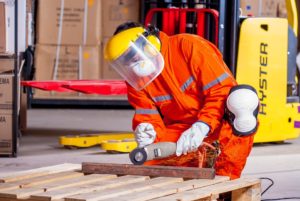A survey carried out by SPLENDID RESEARCH GMBH and AECOPS on behalf of BOSCH aims at highlighting the application of safety measures adopted in electro-tools. It emerges 60% of professionals dedicate less than 20 minutes a day to the application of such measures and the metal sanding sector is particularly attentive.
 Investigating the relation of professionals and artisans with the measures for the health safety and protection at work: it is the target of a research commissioned by Bosch Professional to Splendid Research GmbH and to AECOPS, which has involved 952 professionals in 8 European Countries (Germany, Spain, Italy, Sweden, United Kingdom, France, Benelux and Portugal). Carpentry operators, besides other professional categories like blacksmiths, electricians, plumbers, installers in the sector of heating and conditioning plants, have expressed their opinion on the theme, revealing great awareness but also some lacks.
Investigating the relation of professionals and artisans with the measures for the health safety and protection at work: it is the target of a research commissioned by Bosch Professional to Splendid Research GmbH and to AECOPS, which has involved 952 professionals in 8 European Countries (Germany, Spain, Italy, Sweden, United Kingdom, France, Benelux and Portugal). Carpentry operators, besides other professional categories like blacksmiths, electricians, plumbers, installers in the sector of heating and conditioning plants, have expressed their opinion on the theme, revealing great awareness but also some lacks.
Race against time
The first big factor interposed between professionals and safety is the time dedicated to protection and prevention measures: European results reveal that 23% of interviewees do not invest absolutely time, or less than 5 minutes a day, to equip themselves with protection devices. 50% of interviewees only seldom interrupt their work to be compliant with safety standards in force and just slightly more than one third of workers (precisely 27%) interrupt their activity several times a day to conform to the regulation. Spain and Portugal exceed the average, with a higher percentage of users who instead dedicate more than 10 minutes to this activity. Italians mirror instead the European average in the work interruption time to comply with the regulation, which in 50% of cases is null or very short: 30% of them declare they invest from 0 to 5 minutes to equip themselves with protection devices.
Higher efficiency with improved safety standards
Although the compliance with safety standards needs time, the results of the research demonstrate, then, this does not affect the workflow, as 60% of interviewees on European scale declare they do not interrupt their work at all, or very unfrequently. British are more virtuous from this point of view, with 26% of interviewees stating they do not interrupt their activity very often (European average 13%). According to the answers received, in Italy slightly more than one fourth of artisans (exactly 29%) have a break several times a day, to grant the conformity with safety standards. Just 15% have frequent breaks and 13% work uninterruptedly.
A very interesting datum, which proves how the integration of safety and protection systems and devices inside the working process is one of the elements on which it is worth intervening to improve further professionals’ daily activities.
Protection functions and accessories: which are priority for professionals?
Analysing the European average, most of professionals tend to assign higher importance to more easily “tangible” safety devices: protection glasses are deemed the most important by 20% of European and Italian interviewees, followed by protections against dust (19%) and noise (18% in Europe, 13% in Italy) – less relevant are considered the solutions intended for dampening the effects of vibrations and helmets. Among European colleagues, Spanish and Portuguese are the most careful: respectively the 31% and 26% percentage of workers think that all head and hand protection devices have the same importance.
Priority health and safety during some operations
Considering specific operations, almost all European professionals agree in paying particular attention during metalworking. In particular, 40% of interviewees in our Country think the protection and safety theme is a priority in the fulfilment of this activity, followed by 36% in the woodcutting and 13% in the drilling of concrete.
All want more safety
When interviewees were asked to tell their wishes in terms of safety devices integrated into electro-tools, very few of them declared they are satisfied with the functions currently available on the market (4% the European average, 2% in Italy). However, professionals and artisans hardly succeed in explaining in detail what specific functions they would like were implemented – in Italy, 23% just ask for more safety in general, and 13% express their desire of dust protection devices.



